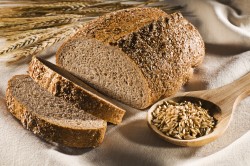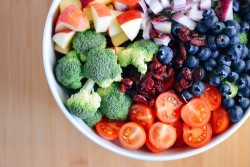Many people are not sure how to lose weight in a healthy and natural way. Many websites and advertisements, especially those that sell diet pills or other weight loss products, spread false information about weight loss.
According to a 2014 study, most people seeking weight loss advice are confronted with false or misleading information.
People can get sick from "fashionable" diets and exercise programs.
According to reliable sources, the Centers for Disease Control and Prevention, it is safer to lose 1 to 2 pounds per week. Many people who lose weight quickly or follow a fad diet are more likely to recover later.
There are many science-backed ways to help people lead a healthy lifestyle. Including:
1. Offer healthy snacks at home and at work

To avoid overdosing on sugar and salt, it's important to have healthy snacks on hand at all times, whether at home or at work.
If you have a lot of prepackaged treats and candies on hand, you're more likely to eat them.
People find it harder to lose or maintain their weight by eating unhealthy foods at home, according to a study by well-known people.
Nutritional needs can be met by serving healthy snacks at home and at work and avoiding excess salt and sugar. Some of the best snacks include:
· Natural, unsalted, unsweetened nuts
· Fruit
· Fresh pre-crushed product
· Low-fat yogurt
· Dried seaweed
· Restrictions on processed foods
Processed foods are high in sugar, salt, fat, and calories. On the other hand, whole foods usually contain more nutrients.
People who regularly eat processed foods are more likely to overeat compulsively, according to preliminary results from a study.
2. Increase your protein intake.

A high-protein diet makes it easier to lose weight. Existing research on high-protein diets suggests that they are an effective strategy for preventing or treating obesity.
Overall, a high-protein diet of 25-30 grams per meal improved hunger, weight control, cardiovascular risk factors, or all.
Eggs, fish, chicken, lean meats and beans should be a person's main food sources. This list includes many foods that are high in protein and low in fat. These are some examples of leptin:
· fish
· Legumes, such as peas, beans, and lentils
· White poultry
· Low-fat cottage cheese
· Tofu
3. No sugar added

It's not always possible to completely eliminate sugar from your diet, but cutting out processed foods is a good first step.
According to the National Cancer Institute, men 19 and older should eat 19 teaspoons of added sugar a day. The average daily sugar intake for women in the same age group was more than 14 teaspoons.
Fruit sugar (fructose) makes up a large portion of your daily caloric intake because the liver converts it into lipids in the liver. The liver releases fat cells into the blood after converting sugar into fat, leading to weight gain.
4. Having a cup of black coffee.

A cup of coffee has health benefits if sugar and fat are avoided. According to a review article, coffee has been found to increase the body's ability to break down carbohydrates and lipids.
According to research on the subject, drinking coffee can reduce the chances of developing liver disease and diabetes.
5. Staying hydrated

When it comes to beverages, water is the best option for most people to drink throughout the day. In addition to numerous health benefits, there are no calories.
When a person drinks water throughout the day, their metabolism speeds up. Reduce the amount of food you eat by drinking water before meals.
Finally, people who drink water instead of sugar-sweetened beverages can lower their calorie intake throughout the day.
6. Limit consumption of high-calorie beverages

Consumption of sugar-sweetened beverages such as Coca-Cola or Pepsi, as well as sports and energy drinks, can lead to obesity and make weight loss more difficult.
In addition to alcoholic beverages, high-calorie beverages include coffee specials such as latte macchiatos, which contain sugar and milk.
Replace these drinks with water, lemonade, or herbal tea.
7. Avoid processed carbohydrates.

Eating a whole grain diet can reduce weight and prevent disease.
According to one reliable source, refined carbohydrates are more harmful to the body's metabolism than saturated fats.
When sugar intake from refined carbohydrates increases, fat is released into the bloodstream.
Whole grains can help someone lose weight and keep it off.
The following foods are examples of simple or refined carbohydrates:
· White rice
· White bread
· White flour
· Candy
· Various grains
· Added sugar
· Noodles
Whole-grain versions of rice, pasta, and bread are all available, and they can all help with weight loss and disease prevention by reducing inflammation in the gastrointestinal tract.
8. Alternate Lent

Short-term fasting cycles have been shown to help with weight loss. If you're trying to lose weight and maintain it long-term, a 2015 study found that alternate-day or intermittent fasting may be beneficial.
Fasting is not for everyone. Children, teens, pregnant women, the elderly and people with pre-existing medical conditions are all at risk if they go without food for extended periods of time.
9. Keep a food diary and count calories

Counting calories can help you avoid overeating. If a person tracks their calorie intake, they can see how much they eat. A better understanding of their calorie intake can help them make better nutritional choices.
You can use a food diary to keep track of what you eat and how much. In this way, they can ensure that they eat plenty of each healthy type of food, such as vegetables and protein.
10. Brush your teeth after meals or before bed

Brushing your teeth can improve dental hygiene and reduce cravings for overeating between meals.
Brushing your teeth earlier can reduce the desire to eat unhealthy snacks in the evening.
11. Increase your intake of fruits and vegetables

Eating more fruits and vegetables can help you lose weight and maintain it in the long term.
According to reliable sources, encouraging people to eat more fruits and vegetables will not lead to weight gain, even if you don't tell them to cut back on other meals.